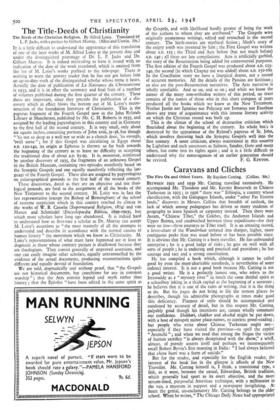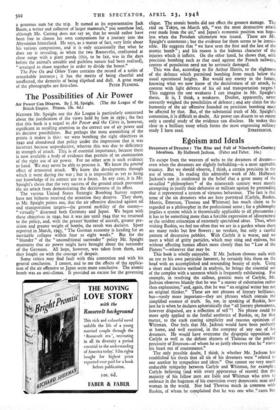Caravans and Cliches
The Fire Ox and Other! Years. By Suydam Cutting. (Collins. 30s.)
BETWEEN 1925 and 1939 Mr. Cutting travelled extensively. He accompanied Mr. Theodore and Mr. Kermit Roosevelt to Chinese Turkestan in 1925 - in 5926 " there was " Ethiopia, a country whose classification, with the Galapagos Islands, under " other Far Eastern lands," discovers in Messrs. Collins that breadth of outlook, the lack of which among pedagogues has driven so many students of geography to learn Spanish or carpentry instead. Then there were Assam, " Chinese Tibet," the Celebes, the Andaman Islands and Upper Burma, and sandwiched between these expeditions—for they were no less—three journeys to Tibet itself. It is an amazing record, a fever-chart of the Wanderlust serrated into sharper, higher, more contiguous peaks than was usual before or has been possible since. It is obvious that Mr. Cutting is a born traveller. He has unbounded enterprise ; he is a good judge of risks ; he gets on well with all sorts of people ; he is enduring and practical and provident ; he has courage and tact and a strong constitution.
He has compiled a book which, although it cannot be called good by even the most charitable standards, is nevertheless of some indirect interest. It is not a good book because Mr. Cutting is not a good writer. He is a perfectly. honest one, who refers to the Irrawaddy as a "mystery river" in much the same dutiful spirit as a schoolboy inking in a thick capital at the beginning of a sentence ; he believes that it is one of the rules of writing, that it is the thing to do. But his pages do not bring to life the remote places be describes, though his admirable photographs at times make good this deficiency. Flatness of style should be accompanied and condoned by accuracy of detail, but in this respect Mr. Cutting, palpably good though his intentions are, cannot wholly command our confidence. Shikkari, chakkor and aksekal might be put down, with a host of misspelt minor place-names, to careless proof-reading ; but people who write about Chinese Turkestan ought not— especially if they have visited the province—to spell the capital " Arumchi " ; and when we read that among the Nagas the victim of human sacrifice "is always decapitated with the dhow," a whiff, almost, of parody asserts itself and perhaps we inconsequently recall Robert Byron's first morning in India: " I had always believed that chota hazri was a form of suicide."
But for the reader, and especially for the English reader, the interest of the book lies in the glimpse it affords of the New Traveller. Mr. Cutting himself is, I think, a transitional type, a link, as it were, between the casual, Edwardian, British tradition, which generally had sport as its overt objective, and the more stream-lined, purposeful American technique, with a millionaire in the van, a museum in support and a newspaper invigilating. At heart the genial, un-exclamatory Mr. Cutting belongs to the older school. When he writes, " The Chicago Daily News had appropriated
a generous sum for the trip. It named as its representative Jack Baum, a writer and collector of larger mammals," you somehow feel, although Mr. Cutting does not say so, that he would rather have been free to choose his own companions for a journey into the Abyssinian hinterland. He says, as a matter of fact, very little about his various companions, and it is only occasionally that what he does say is revealing, as when the two Roosevelts, confronted at close range with a giant panda (this, to be fair, was in the days before the animal's amiable and guileless nature had been realised), " arranged to shoot together in order to divide the honor." The Fire Ox and Other Years contains the record of a series of remarkable journeys ; it has the merits of being cheerful and unaffected, the demerits of being slipshod and dull. A great many



































 Previous page
Previous page